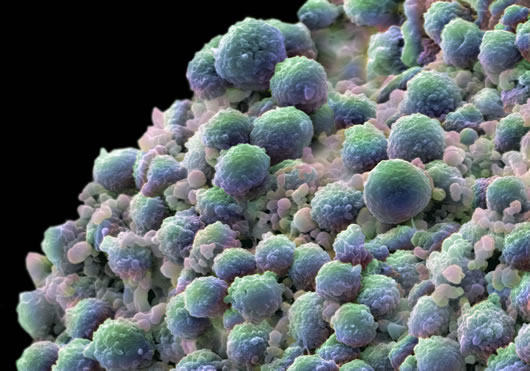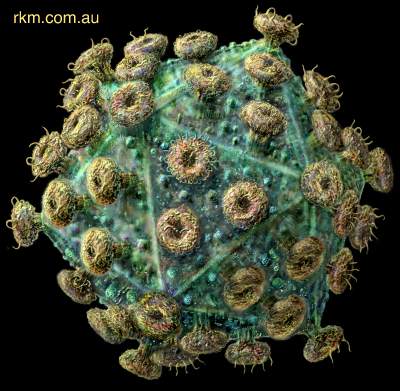
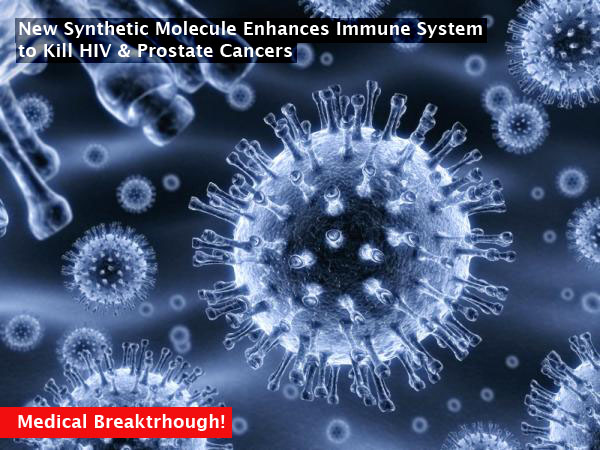
Cancers are abnormal cells that reproduce faster than they can be destroyed. Abnormal cells are found throughout our body and are recognized by our immune system as "aliens" and are attacked and eliminated from the body.
The immune system is like an army. Once a member of this army has identified an intruder as being "different" it passes this information on to other members of the immune system who seek out the intruders and destroy them. But it doesn't always work that smoothly. Sometimes alien cells have strategies that elude the immune system. They may have special coatings that make them invisible to immune cells or they may be able to change their appearance too fast for the immune system to recognize them as being "different." A good example of these strategies are found in two of the most difficult diseases to treat -- prostate cancer and HIV.
Treatments are difficult because the prostate cancer is a disease where the abnormal cells have developed a strategy against the immune system. Traditional remedies, like radiation and chemotherapy, are not reliable and have many side effects. But now there appears to be good news. As reported first in ScienceDaily, researchers at Yale University have developed synthetic molecules capable of enhancing the body's immune response to HIV and HIV-infected cells, as well as to prostate cancer cells. Their findings, published online in the Journal of the American Chemical Society, could lead to novel therapeutic approaches for these diseases. The molecules -- called "antibody-recruiting molecule targeting HIV" (ARM-H) and "antibody-recruiting molecule targeting prostate cancer" (ARM-P) -- work by binding simultaneously to an antibody already present in the bloodstream and to proteins on HIV, HIV-infected cells or cancer cells. By coating these pathogens in antibodies, the molecules flag them as a threat and trigger the body's own immune response. In the case of ARM-H, by binding to proteins on the outside of the virus, they also prevent healthy human cells from being infected. "Instead of trying to kill the pathogens directly, these molecules manipulate our immune system to do something it wouldn't ordinarily do," said David Spiegel, Ph.D., M.D., assistant professor of chemistry and the corresponding author of both papers. Because both HIV and cancer have methods for evading the body's immune system, treatments and vaccinations for the two diseases have proven difficult.
Current treatment options for HIV and prostate cancer -- including antiviral drugs, radiation and chemotherapy -- involve severe side effects and are often ineffective against advanced cases. While there are some antibody drugs available, they are difficult to produce in large quantities and are costly. They also must be injected and are accompanied by severe side effects of their own. By contrast, the ARM-H and ARM-P molecules, which the team has begun testing in mice, are structurally simple, inexpensive to produce, and could in theory be taken in pill form, Spiegel said. And because they are unlikely to target essential biological processes in the body, the side effects could be smaller, he noted. "This is an entirely new approach to treating these two diseases, which are extraordinarily important in terms of their impact on human health," Spiegel said. HIV is a global pandemic that affects 33 million people worldwide, while prostate cancer is the second leading cause of cancer-related death among American men, with one out of every six American men expected to develop the disease. [Funding for this research was provided by the National Institutes of Health.]
| ||
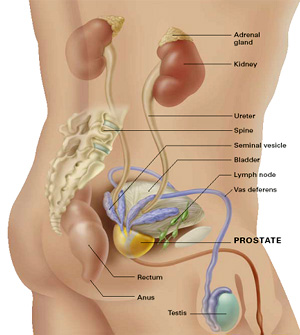 Prostate cancer is just now getting lots of attention because the American population known as the "baby boomers" are getting older. It has been said that if you live long enough, and are male, you will suffer from prostate cancer. Autopsies of men, aged 70 years or older who died from other causes, had an 80% incidence of prostate cancer.
Prostate cancer is just now getting lots of attention because the American population known as the "baby boomers" are getting older. It has been said that if you live long enough, and are male, you will suffer from prostate cancer. Autopsies of men, aged 70 years or older who died from other causes, had an 80% incidence of prostate cancer.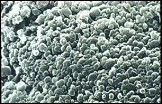 Epithelial cells of the prostate secrete prostasomes [right] as well as PSA. Prostasomes are membrane-surrounded, prostate-derived organelles that appear extracellularly, and one of their physiological functions is to protect the sperm from attacks by the female immune system. Cancerous prostate cells continue to synthesize and secrete prostasomes, and may be shielded against immunological attacks by these prostasomes. Research of several aspects of prostasomal involvement in prostate cancer has been performed.
Epithelial cells of the prostate secrete prostasomes [right] as well as PSA. Prostasomes are membrane-surrounded, prostate-derived organelles that appear extracellularly, and one of their physiological functions is to protect the sperm from attacks by the female immune system. Cancerous prostate cells continue to synthesize and secrete prostasomes, and may be shielded against immunological attacks by these prostasomes. Research of several aspects of prostasomal involvement in prostate cancer has been performed.